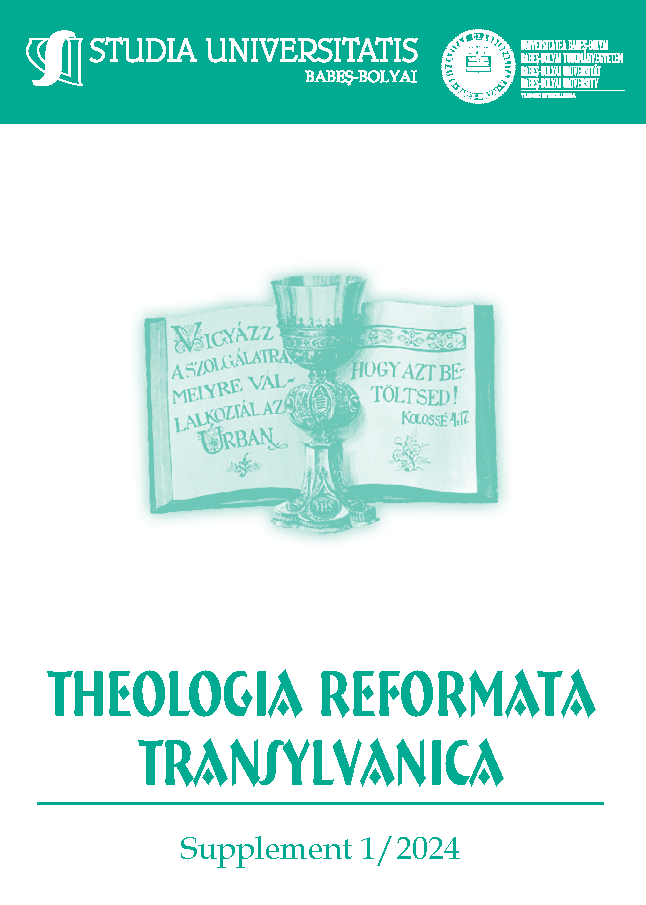The Youth Inner Mission and the Soli Deo Gloria
DOI:
https://doi.org/10.24193/subbtref.69.suppl1.03Keywords:
inner mission, youth ministry, Reformed Church, SDG, communismAbstract
From the 19th century, as a parallel field of foreign missionary work, the Hungarian inner mission followed Western (English, German) models and established associations to revive the stagnating religious life and to help those less fortunate in a miserable situation. The urbanisation of the period affected greatly the families moving to the capital, where some of them had become disconnected from their church roots, and the lack of a social safety net led to a high level of poverty and the moral decay that accompanied it. In the first half of my study, I looked at the beginnings of the Hungarian inner mission and then I wrote about evangelising and educating associations for youth and children, such as the Protestant Orphans’ Association, the Sunday School Association and the Christian Youth Association, which was modelled on the YMCA. In the second part, I discussed the social and faith-based activities of the specifically Hungarian Reformed Soli Deo Gloria Student Movement.
References
FÓNYAD, Dezső (ed.) (1936): Bevezetés a diákmissziós munkába. Budapest, Soli Deo Gloria Református Diákmozgalom.
FORGÁCS, Gyula (1925): A belmisszió és a cura pastoralis kézikönyve. Pápa, Magyar Református Egyház.
GÉRA, Eleonóra Erzsébet (2006a): Az Országos Protestáns Árvaegylet és árvaháza. In: Kósa, László (ed.): Reformátusok Budapesten. Vol. 2. Budapest, Argumentum – ELTE BTK Művelődéstörténeti Tanszék. 917–941.
(2006b): Nagypénteki Református Társaság. In: Kósa, László (ed.): Reformátusok Budapesten. Vol. 2. Budapest, Argumentum – ELTE BTK Művelődéstörténeti Tanszék. 1049–1075.
KISS, Réka (2020): A magyar Wallenberg. Soos Géza. In: Czókos, Gergely – Kiss, Réka – Máthé, Áron – Szalai, Zoltán: Magyar hősök. Elfeledett életutak a 20. századból. Budapest, Mathias Corvinus Collegium Alapítvány, Nemzeti Emlékezet Bizottsága. 383–387.
KÓSA, László (2006): Az egyesületek a budapesti reformátusság életében. In: Kósa, László (ed.): Reformátusok Budapesten. Vol. 2. Budapest, Argumentum – ELTE BTK Művelődéstörténeti Tanszék. 1077–1117.
KOVÁCS, Ábrahám (2006a): A magyarországi vasárnapi iskolai mozgalom kialakulása és szervezeti megerősödése. In: Kósa László (ed.): Reformátusok Budapesten. Vol. 2. Budapest, Argumentum – ELTE BTK Művelődéstörténeti Tanszék. 997–1013.
(2006b): Szabó Aladár és az Új óramutató. In: KÓSA, László (ed.): Reformátusok Budapesten. Vol. 1. Budapest, Argumentum – ELTE BTK Művelődéstörténeti Tanszék. 511–522.
LÁNYI, Gábor (2019): Bishop Albert Bereczky (1893–1966). A Life Full of Questions. In: Kovács, Ábrahám – Shin, Jaeshik (eds.): Nationalism, Communism and Christian Identity: Protestant Theological Reflections from Korea and Hungary. Debrecen – Gwangju, Debreceni Református Hittudományi Egyetem – Honam Theological University and Seminary. 123–140.
LÁNYI, Gábor (2021): Sebestyén Jenő (1884-1950) és a történelmi kálvinizmus. In: Petrás, Éva: A 20. századi magyar protestáns közéletiség arcképcsarnoka. Budapest, Barankovics István Alapítvány – Gondolat Kiadó. 13–32.
LÁNYI, Gábor (2022): Sebestyén Jenő, a történelmi kálvinizmus és a Soli Deo Gloria Református Diákszövetség. In: Studia Universitatis Babeş–Bolyai, Theologia Reformata Transylvanica. 67, 1. 259–296.
LÁNYI, Gábor (2023): “Inkább okos voltam, mint erős”. Ravasz László lemondatásának körülményei (1948). In: Kiss, Réka – Lányi, Gábor (eds.) (2023): Ravasz 100, Püspöki jelentések. Budapest, Dunamelléki Református Egyházkerület – Károli Gáspár Református Egyetem – Kálvin Kiadó. 49–52.
MOLNÁR, Sándor Károly (2011): A két világháború közötti protestáns egyesületek belépési nyilatkozatainak elemzése. In: Egyháztörténeti Szemle. XII, 1. 109–124.
RÉVÉSZ, Imre (1992): Egyháztörténelem. Budapest, Budapesti Református Teológiai Akadémia. 69.
RIGÓ, RÓBERT (2022): A Soli Deo Gloria Református Diákszövetség Kecskeméten. In: Studia Universitatis Babeş–Bolyai, Theologia Reformata Transylvanica. 67, 1. 226–240.
SOOS Géza (1936): Szervezés és szervezet. In: Fónyad, Dezső (ed.): Bevezetés a diákmissziós munkába. Budapest, Soli Deo Gloria Református Diákmozgalom. (1938): Mit akar a SDG mozgalom? Budapest, Soli Deo Gloria Szövetség.
SVÉD László (2013): Az 1942, 1943-as évek balatonszárszói találkozóinak ifjúságtörténeti előzményei. In: Múltunk, 2013/1. 101–147.
SZEKÉR, Nóra (2009): A magyar közösség története. PhD dissertation. Budapest, Pázmány Péter Katolikus Egyetem, Történelemtudományok Doktori Iskola.
Archives:
Synodal Archive, fonds 24, box 2, 25 July 1948. 101.
Synodal Archive, fonds 24, box 2, 17 December 1949.
Downloads
Published
How to Cite
Issue
Section
License
Copyright (c) 2024 Studia Universitatis Babeș-Bolyai Theologia Reformata Transylvanica

This work is licensed under a Creative Commons Attribution-NonCommercial-NoDerivatives 4.0 International License.






